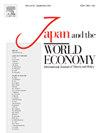Does SME policy enhance the adjustment of trade credit? Evidence from a revision of the Subcontract Act in Japan
IF 1.2
4区 经济学
Q3 ECONOMICS
引用次数: 0
Abstract
In this paper, we examine whether small and medium enterprises (SMEs) face severe constraints in adjusting their trade receivables by focusing on the 2016 revision of the Subcontract Act of Japan. Small businesses typically have weaker bargaining power than their customers because they are likely to depend on certain customers. Accordingly, many small businesses face severe constraints in the adjustment of their trade receivables. The Subcontract Act prohibits customer firms from receiving trade credit from small businesses over the long term, and this was enforced more strictly after 2016 following a regulatory revision. This made it easier for small businesses to adjust their trade receivables if their level was considered excessive, serving to enhance the speed of adjustment. We find that trade receivables decreased by an average of 2.1 days following the policy change for the main target firms of the Subcontract Act. Our results also show that small businesses could more rapidly adjust their trade receivables than large firms, both before and after the revision. On this basis, we conclude that while the policy effects on the level of trade receivables are significant, those on the adjustment are not.
中小企业政策是否促进了贸易信贷的调整?来自日本《分包法》修订的证据
本文以2016年日本《分包法》的修订为重点,考察了中小企业在调整贸易应收账款方面是否面临严重约束。小企业通常比他们的客户有更弱的议价能力,因为他们可能依赖于某些客户。因此,许多小企业在调整其贸易应收款方面面临严重的限制。《分包法》禁止客户公司长期从小企业获得贸易信贷,2016年监管修订后,这一规定得到了更严格的执行。这使小企业在认为应收帐款数额过高的情况下更容易调整其应收帐款,从而加快调整的速度。我们发现,对于分包法案的主要目标公司,在政策变化后,贸易应收账款平均减少了2.1天。我们的研究结果还表明,无论是在修订前后,小企业都能比大公司更快地调整其贸易应收账款。在此基础上,我们得出结论,虽然政策对应收账款水平的影响是显著的,但对调整的影响并不显著。
本文章由计算机程序翻译,如有差异,请以英文原文为准。
求助全文
约1分钟内获得全文
求助全文
来源期刊

Japan and the World Economy
ECONOMICS-
CiteScore
2.60
自引率
0.00%
发文量
26
审稿时长
46 days
期刊介绍:
The increase in Japan share of international trade and financial transactions has had a major impact on the world economy in general and on the U.S. economy in particular. The new economic interdependence between Japan and its trading partners created a variety of problems and so raised many issues that require further study. Japan and the World Economy will publish original research in economics, finance, managerial sciences, and marketing that express these concerns.
 求助内容:
求助内容: 应助结果提醒方式:
应助结果提醒方式:


